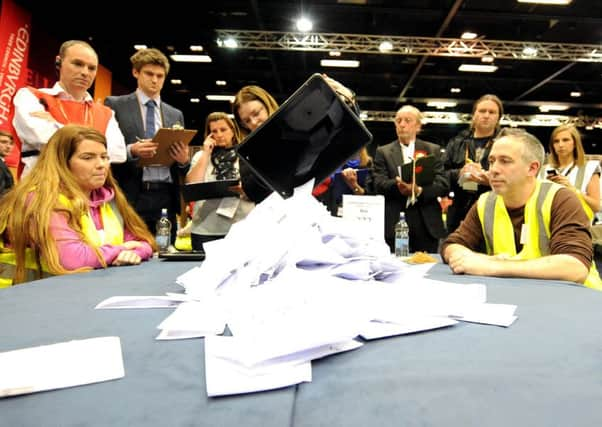Alison Johnstone: Politicians need to give the public more power


Engagement is also happening at a very local level. Events such as Leith Decides are rightly described as participation rather than consultation. Dozens of organisations are hoping for funding and it’s up to local people to decide how the available £22,000 gets spent. (The results are due next Monday.)
But between the national frenzy of a referendum and community-level participatory budgeting, there remains a worrying gulf in our democracy. It has been reported that across the UK, 800,000 people have fallen off the electoral register following changes to registration. That’s almost a million people without a voice as we approach a Scottish Parliament election, and more than likely a referendum on European Union membership.
Advertisement
Hide AdAdvertisement
Hide AdIn secondary schools many 16-year-olds are registering as the Holyrood election nears, and campaigns such as Bite the Ballot will encourage first-time voters to turn out on the day. But what more should we be doing?
It’s easy to blame Westminster for turning people off politics, with its outdated and unfair voting system and its unelected House of Lords. But let’s not forget, the turnout in the 2011 Holyrood election was just over 50 per cent, so almost two million Scots who could have voted chose not to.
Our political system values conflict. We have roaring and cheering in parliamentary debates; First Minister’s Questions can descend to the level of a Punch and Judy show. It does feel we’ve strayed from how our new parliament was envisaged. In his poem to mark its opening, Edwin Morgan said people “want it to be filled with thinking persons as open and adventurous as its architecture”.
Our centralised state is undoubtedly another factor. As we enter yet another year of the council tax freeze, we see power taken away from local people.
Advertisement
Hide AdAdvertisement
Hide AdAnd it’s not just in politics that we see systems that grind people down and make them reluctant to get involved. Edinburgh Airport recently declared its controversial trial of a new flight path a success, despite receiving almost 8,000 complaints from residents. While a final decision has yet to be made, it’s no surprise many people are already scunnered.
Then there’s the lack of third party right of appeal in planning decisions. At the moment, applicants for planning permission can appeal against refusal but there is no such option for the objectors. Campaign groups such as Planning Democracy are rightly renewing calls for equal rights of appeal to make planning authorities properly accountable.
The Scottish Government has in the past backed away from such a change but in the current climate of demands for bold land reform and meaningful community empowerment, ministers would be wise to revisit the issue.
If we want democratic engagement, politicians need to share power with the people. As Edwin Morgan put it: “We give you our consent to govern, don’t pocket it and ride away.”
• Alison Johnstone is Scottish Green MSP for Lothian